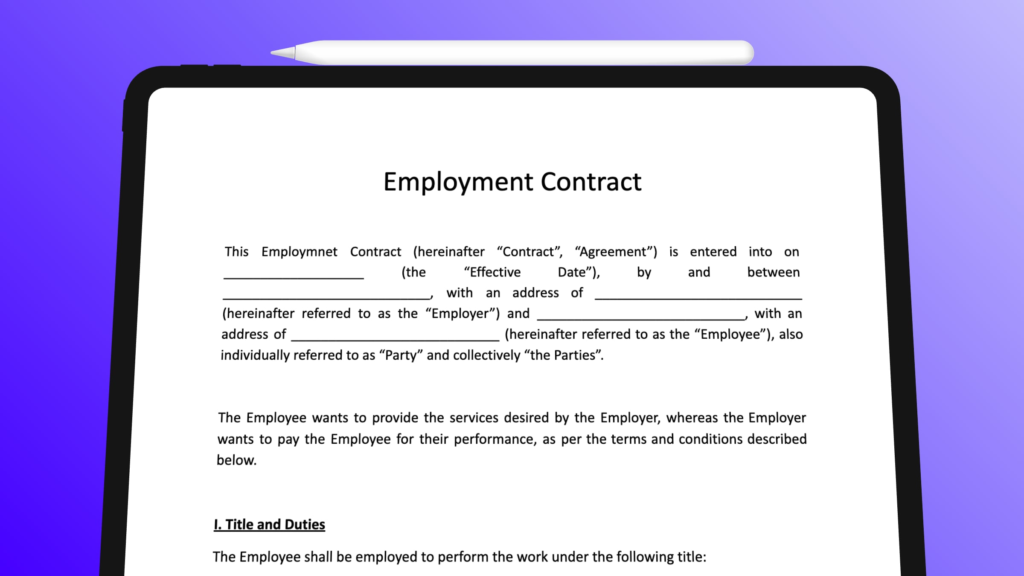Understanding how employment works in any country can be tricky. The Saudi Labor Law serves as the guidebook for employment regulations in the country. An employment contract in Saudi Arabia goes beyond being a mere formality.
A pivotal document safeguards the rights and responsibilities of both employers and employees. Ensuring that your contract adheres to the stipulated guidelines is crucial for maintaining a legally compliant and secure working environment.
This article offers a comprehensive overview of the essential components that should be incorporated into an employment contracts and employment agencies in Saudi Arabia. By understanding and implementing these elements, individuals can navigate the complexities of the Saudi Labor Law, fostering a fair and lawful work environment for all parties involved.
Employment Contracts in Saudi Arabia: Must-Knows for Employers and Employees
According to Article 50 of the Saudi Labor Law, an employment contract is an agreement where a worker commits to performing duties under the direction or oversight of an employer in exchange for a wage.
"" Notably, Article 51 emphasizes that a contract of Saudi Labor Law is valid even if it is unwritten, meaning it’s considered legitimate if agreed upon verbally. In such cases, the worker can validate the contract and their ensuing rights using any method of proof.""
Types of Employment Contracts: Fixed-Term vs. Non-Fixed Contracts
Contracts can be categorized based on duration into fixed-term and non-fixed contracts. Each type has unique rules regarding termination, compensation, contract renewal, and end-of-service rewards. Explore our latest blog to delve deeper into The Key Differences between Fixed and Non-Fixed Contracts.

Image Source: Usesignhouse.com
Building a Comprehensive Employment Contract in Saudi Arabia
1) Employer and Employee Details:
- In Saudi employment contracts, include specific details about the employer and employee.
- Details should cover the employer’s name, job location, and worker’s information such as name, nationality, ID number, and address.
- This ensures thorough documentation and clarity in understanding the employment terms.
2) Role and Job Description:
In Saudi employment contracts, it’s really important to say exactly what the employee will be doing. This means explaining their job and what they’re responsible for, so everyone understands clearly.
3) Start Date and Duration:
All contracts should clearly say when the job starts. If it’s for a specific time, like a few months, it should also say when it will end. The contract should also talk about how much notice is needed if someone wants to leave, usually between 30 to 60 days. And if someone leaves the job for the wrong reasons, the contract should say how they’ll be compensated.
4) Salary Breakdown:
When talking about how much someone gets paid in Saudi Arabia, it’s not just about the basic salary. The contract should list all the different parts of the pay, like extra allowances, so everyone knows exactly what the total compensation is.
5) Working Hours and Overtime:
The contract should explain the regular hours someone has to work, the rules for working extra hours, and when they can take time off. In Saudi Arabia and Saudi Labor Law, the most someone can work is six days a week, 8 hours a day, not counting break time. And no one should work continuously for more than 5 hours.
6) Probation Period:
The contract needs to talk about the first few months on the job, called the probation period. Usually, it’s 90 days, but it can be longer if both the employer and the employee agree. During this time, either party can end the contract without compensation.
7) Holiday Entitlements:
In Saudi Arabia, employees get time off for holidays and vacations. The contract should mention how much time off, at least 21 days a year, and after 5 years with the same employer, it increases to 30 days annually.
8) End-of-Service Award:
When someone leaves a job in Saudi Arabia by recruitment agencies, the employer has to give them an award. It’s like a bonus and depends on how long they worked. For the first five years, it’s half a month’s pay for each year, and after that, it’s a full month’s pay for every year. The contract should be clear about what counts as ‘pay’ for this award.
9) Confidentiality and Non-Compete Clauses:
- Special rules in the contract keep company secrets safe.
- The ‘Confidentiality Clause’ prevents employees from sharing or misusing company information after leaving.
- The ‘Non-Compete Clause’ restricts them from working for a competitor or starting a similar business for a specified time and place after leaving.
- These clauses are common in Saudi contracts but must be fair to be enforceable.
- Courts may reject overly strict clauses, emphasizing the importance of clarity and employee agreement.
- Ensuring the employee understands and agrees to these rules is crucial for their effectiveness.

Image Source: businesslinkuae
Additional Considerations for Saudi Labor Law
- Make sure any extra rules in the contract don’t go against the Saudi Labor Law.
- If the job is for a specific task, the contract should end when the task is done.
- Employers can’t change where someone works unless the employee agrees in writing.
- After the contract ends, the employer has to give the employee a certificate showing their work experience.
- All contracts should be mostly written in Arabic.
Navigating Saudi Employment Contracts? DITRC is Here to Help!
Understanding how fixed and non-fixed employment contracts work in Saudi Labor Law is important. It’s also crucial to stay updated on the ever-changing job and hiring situation. DITRC, with its 15 years of experience, is here to support you in dealing with these complex situations.
If you need help setting up an HR and staffing plan that follows Saudi rules, DITRC’s GRO and recruitment professionals are ready. Our on-ground experts have a lot of experience and know a ton about Saudi labor rules, visa steps, and how to get the right licenses. Using their knowledge not only makes it easier to work with the government but could also save you up to 60% in operational costs.











.webp)
















